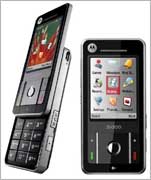The cellphone is a Great Democratic Liberator: 'Great' because of its impact on people; 'democratic' because it gives the same benefits to all; and 'liberator' because it frees us from the terrible infrastructure, says Rama Bijapurkar.
The Bharat Ratna for effecting a quantum jump in the quality of everyday life of ordinary Indians goes to all those who made the amazingly effective cellphone service happen in India.
 Thanks to the fortuitous coming together of reasonable regulation; a pioneering, visionary service provider who demonstrated the success formula and drew in aggressive 'me-too' competitors; and a handset maker who played an un-MNC type game in the market and priced low and distributed widely, the price of ownership and use plummeted to among the lowest in the world, even before the mindless tariff war started.
Thanks to the fortuitous coming together of reasonable regulation; a pioneering, visionary service provider who demonstrated the success formula and drew in aggressive 'me-too' competitors; and a handset maker who played an un-MNC type game in the market and priced low and distributed widely, the price of ownership and use plummeted to among the lowest in the world, even before the mindless tariff war started.
The cellphone quickly transformed from being yet another privilege for the rich to becoming a ubiquitous, life-improving utility that even very modest income people could access.
In the 1950s, Ernest Dichter, a psychologist and a market researcher, created the concept of 'cultural label' of a category - what values, positive or negative, it stands for in a culture. When he did his study on coffee, he found that it carried the cultural label of being a reliever of slothfulness -- think of that 'untidy room littered with unwashed coffee cups and overflowing ashtrays'. He said it had to be 'morally purified' and should carry the label of 'a reward for hard work', and that's when the 'coffee break' came into being.
For us, the cellphone carries the amazing cultural label of a 'Great Democratic Liberator'. 'Great' because of its enormous impact on people; 'democratic' because it provides the same benefits to the rich and the poor; and 'liberator' because it liberates us from the terrible infrastructure that makes the logistics of everyday living a nightmare.
There are many well-documented studies on the economic benefits of tele-use in the lower-income population; less expenditure on useless travel and better price discovery being the most obvious ones.
Hopefully, the Telecom Regulatory Authority of India will factor these into its calculations as it deliberately moves to kill the goose that lays the golden eggs for ordinary Indians.
Hopefully, those deciding the telecom policy will also reflect on the nature of India's GDP. A substantial amount of it comes from small producers who sell through small-channel partners to micro consumers, in one form or the other. A lot of the future growth of the economy will come from those in the third and the fourth quintiles of income, beginning their consumption journey in earnest as their incomes rise.
However, the cellphone helps increase incomes. Ask the vegetable vendor or the electrician on the move about business growth after the cellphone. Ask any salesman who can now utilise the long hours of 'dead time' while stuck in traffic and on trains for setting up appointments, or doing administrative work over the cellphone, with mobile-internet freeing up work time for selling.
However, the Great Democratic Liberator is not just about business. It has its tentacles really deep into modern Indian society. Let's look at two examples of what it does for women.
In the ladies' compartment of most local trains in Mumbai, lots of women are on their cellphones, and not for early morning gossip. They are instructing the illiterate maid in charge of a sick baby to administer the morning dose of medicine; they are calming the nerves of a child leaving for the exam hall from an empty house. They are not taking leave and staying at home, or being unproductive with guilt and worry.
Being available at the other end of the phone line for any emergency is what liberates women who have to battle with long commutes, crowded public transport and then get home and cook, clean and supervise homework.
The next time someone calculates the likely increase in GDP as a result of women's participation in the workforce, think again. Maybe Trai will successfully nuke that too, by engineering a high-cost regime where such constant cellphone-based activity is unaffordable.
Further, we are an affiliative society, in the process of building a new model of an 'individual yet affiliative' society, which is woven around cellphones. We are an expressive society and the cellphone has provided new means of expression -- SMS newsletters, festival greetings, jokes on goings-on in the country, ringtones that express the way you feel about yourself and others, etc.
Anthropologist Shiv Vishwanath says the cellphone will transform India the way the automobile transformed America. Yes, it is truly the central nervous system of new India, and instead of the government trying to make unreasonable amounts of money from it, it should actually give spectrum away for free to de-risk India's economic growth from pathetic infrastructure.
This de-risking would happen even more if the next stage of cheap and accessible broadband and the Internet could happen. Poor India loves technology and will soon do a lot of its work and socialising through this route.
The government and the regulator must see the higher altitude picture -- that they could be destroying the one thing that has delighted the aam aadmi in recent times, and has been a visible symbol of what post-liberalisation India can achieve.
The author is an independent market strategy consultant.











 © 2025 Rediff.com -
© 2025 Rediff.com -